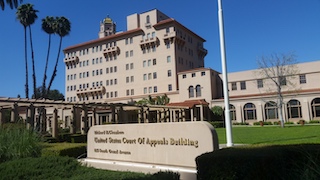As the reader of this article may be aware, a person entering into a plea bargain often waives his or right to appeal as a condition of the resolution of the case.
Such an appellate waiver is enforceable if it meets two criteria: (1) the waiver comprehensively includes the right to appeal and (2) the waiver is made knowingly and voluntarily. United States v. Jeronimo (9th Cir., 2005) 398 F.3d 1149, 1153; overruled on other grounds by United States v. Jacobo Castillo (9th Cir., 2007) 496 F.3d 947, 957.
The following summary describes a recent U.S. Ninth Circuit Court of Appeal case from a Nevada U.S. District Court case, but because it is from the Ninth Circuit, its holding applies to California, so we bring this to the reader’s attention.
“Facing potentially more than seven decades in prison for his role in a string of armed robberies, Eric Goodall struck a plea deal.” Instead, he pleaded guilty to two counts of conspiracy to commit Hobbs Act robbery under 18 U.S.C. § 1951(a) and one count of brandishing a firearm during and in relation to a crime of violence under 18 U.S.C. § 924(c)(3).
As the reader may know, the Hobbs Act prohibits actual or attempted robbery or extortion affecting interstate or foreign commerce in any way or degree. 18 U.S.C. § 1951. Section 1951 also proscribes conspiracy to commit robbery or extortion without reference to the conspiracy statute at 18 U.S.C. § 371.
 U.S. Ninth Circuit Court of Appeals Pasadena
U.S. Ninth Circuit Court of Appeals Pasadena
In light of the many years of imprisonment he faced, Mr. Goodall accepted a 20-year sentencing recommendation from the probation department in the pre-sentencing report and agreed to waive his right to appeal his conviction or sentence.
The judge then deviated downward in sentencing Mr. Goodall, imposing an even shorter sentence of 14 years.
To appreciate how fortunate Mr. Goodall was, it is worth knowing what the government had in evidence against him. In the span of two months, Mr. Goodall and two friends engaged in a series of armed robberies in Las Vegas. The group first targeted a beauty supply store and escaped with $3,500. They then repeated the same routine at another beauty supply warehouse and made off with $1,900.
They then struck an O’Reilly’s Auto Parts store and fled with $1,135.92. They then hit a second O’Reilly’s and made off with $615. They then hit a Cricket Wireless Store and left with $3,848, and then hit a second Cricket store for $600.
They then decided to “go big” and targeted the National Jewelry Liquidation Center, making off with over $700,000 in watches, jewelry and other valuable items. Unknown to them, one of the items contained a GPS tracking device. Las Vegas police then caught up to them and arrested them.
After serving a year and a half of his 14 year sentence, he then tried to “wiggle” (the words of the appellate court) his way out of his plea deal because in 2019, the U.S. Supreme Court issued its ruling in United States v. Davis (2019) 139 S. Ct. 2319, that a conspiracy to commit a Hobbs Act robbery cannot be a crime of violence under the residual clause of 18 U.S.C. § 924(c)(3).
In seeking to void his plea deal, Goodall asked the district court to find his sentence was an “illegal sentence” and therefore was an exception to an appellate waiver under United States v. Torres (9th Cir., 2016) 828 F.3d 1113, 1124-1125.
The district court declined to expand the “illegal sentence” exception and the U.S. Ninth Circuit affirmed the district court.
The Ninth Circuit explained that Goodall entered into an appellate waiver that agreed to “any aspect” of his sentence or conviction. Goodall argued that his plea was unenforceable because it did not specify a waiver of an appeal under Davis, but the Ninth Circuit disagreed because no appeal waiver should have to specify every possible ground for appeal to be enforceable, including the unknown, in order to enforce a plea agreement.
Second, and perhaps more importantly, Goodall’s agreement to the plea was because he regarded it as a good deal for him. He agreed to a 20-year term and the judge made it even better by lowering it to 14 years. Therefore, he knowingly and voluntarily entered into it. “That a better option came up after the fact does not make his choice involuntary at the time he made it.”
We present this summary for the reader who is considering withdrawing from any plea agreement: courts regard such attempts with skepticism.
The citation for the U.S. Ninth Circuit Court of Appeals ruling discussed above is United States v. Eric Goodall (9th Cir, 2021) 15 F. 4th 987.
For more information about pleas and plea bargains in general, please click on the following articles:
 U.S. Ninth Circuit Court of Appeals Pasadena
U.S. Ninth Circuit Court of Appeals Pasadena